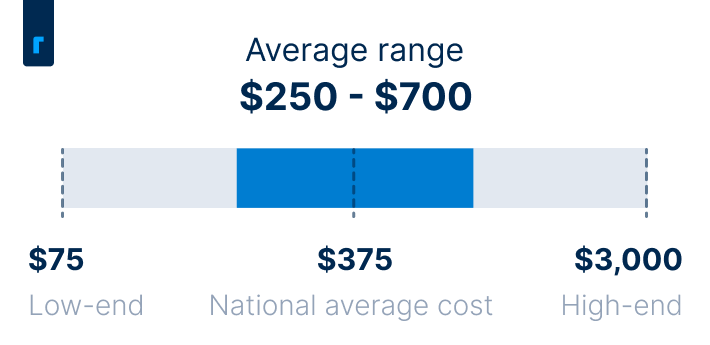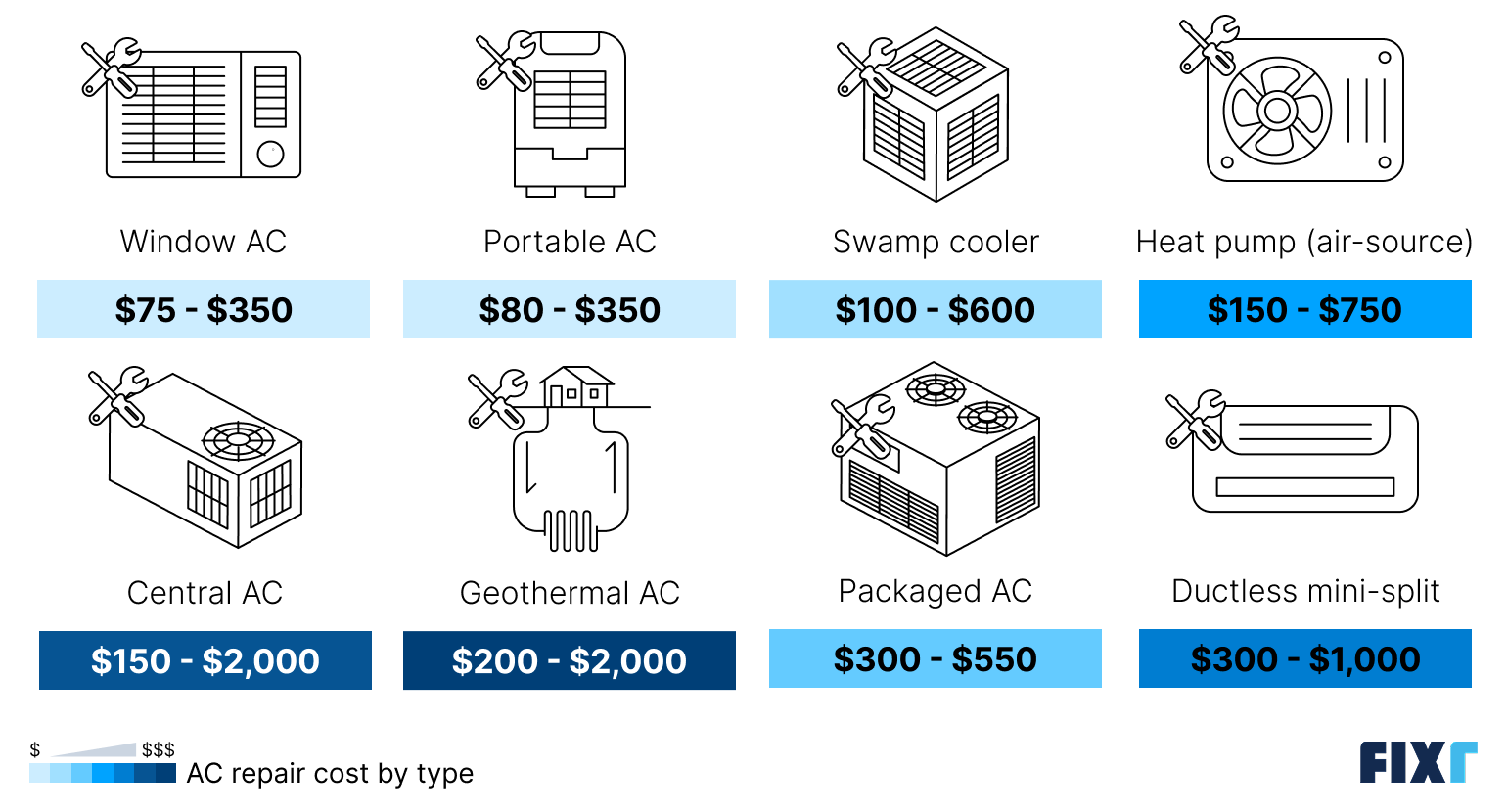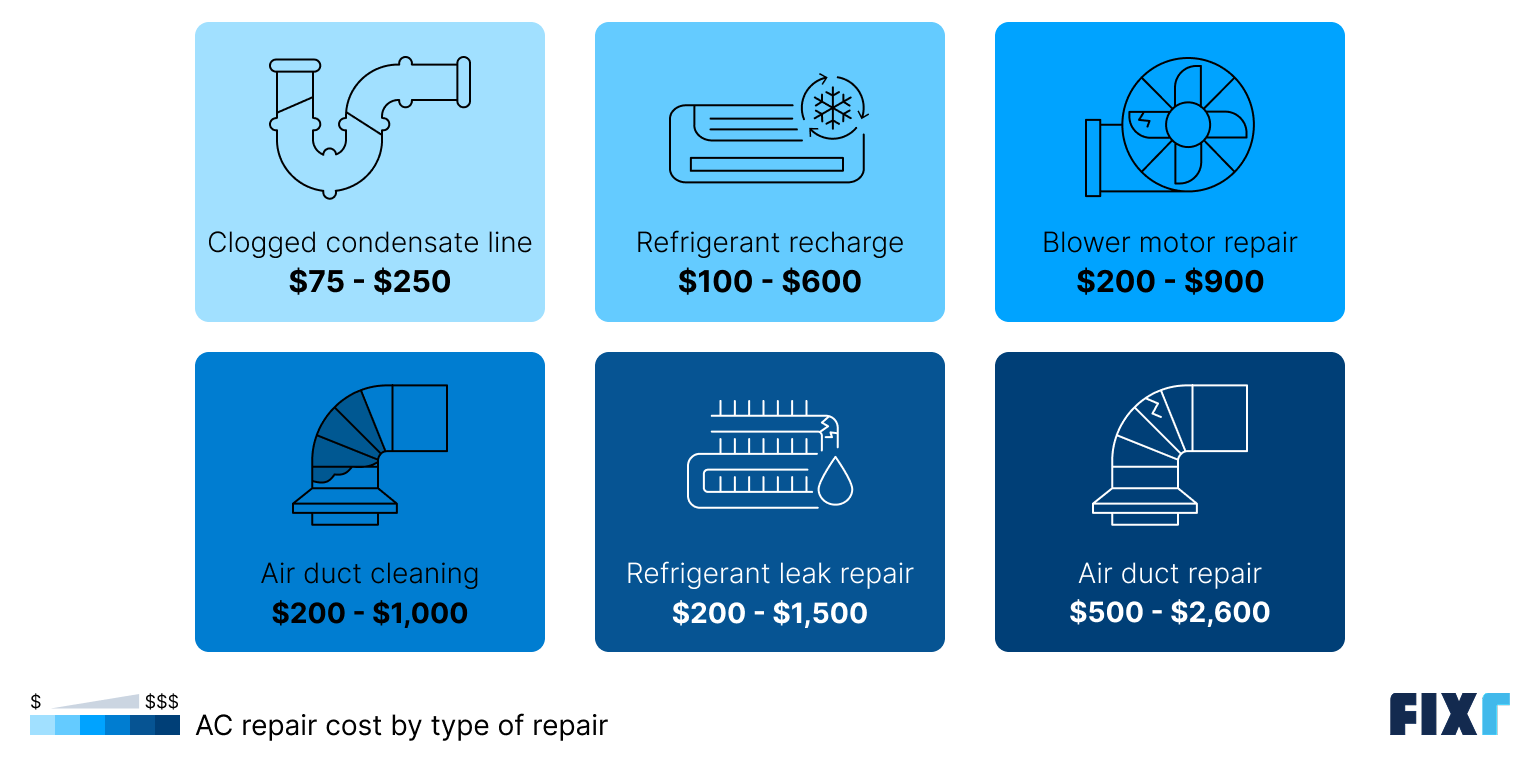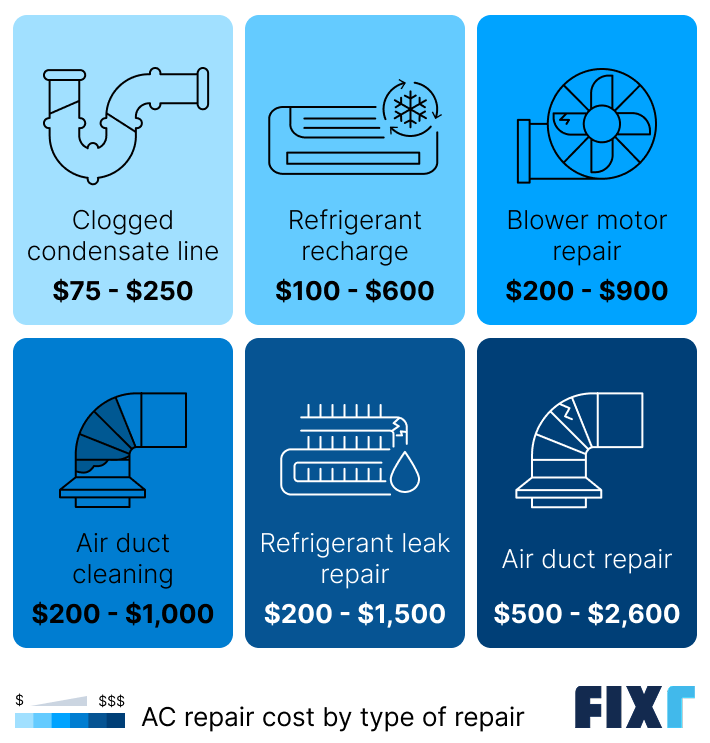Updated: January 29, 2026
Written by Dan Simms
Nieves Martinez is a writer and editor at Fixr.com, specializing in home improvement and construction content. With over five years of experience and a Master's degree in Digital Marketing, she collaborates with industry professionals to create clear, carefully reviewed cost guides and renovation resources that help homeowners make informed remodeling decisions.
Learn moreReviewed by Nieves Martinez
The average cost of AC repair is $375, and most projects total somewhere between $250 and $700. You’ll pay a minimum of $75 in most cases for a service call fee, and prices can climb as high as $3,000 if you need to replace major components like the compressor.
Keeping your air conditioner in good working order is crucial for comfort but also safety, especially if you live in a particularly hot climate. AC systems work tirelessly to keep you and your family comfortable, so repairs are an inevitability. When it comes time to repair your unit, understanding the average AC repair costs for your type of AC and what signs suggest you need a full replacement instead can save you time, money, and frustration.
Average Cost of Air Conditioner Repair


AC Repair Cost Factors
There are a few important factors that can influence your air conditioner repair cost, from the age of your equipment and the type of system you have, to your location and the specific issue you’re experiencing. You’ll often need input from a professional HVAC tech to confirm what the underlying problem is, but you can consider all of the following factors to get a more accurate estimate for your project.
System Age and Condition
Generally speaking, the older your system is, the more likely you are to need more extensive work to get it working again. Major components like compressors and blower motors last for 10 to 15 or 20 years, respectively, so older AC systems are more likely to need these major repairs that can drive costs into the $2,000 to $3,000 range. Newer AC systems more often need minor repairs that will leave repair costs between $250 and $700.
Type of AC Unit
The type of AC unit you have will affect the repair cost, too. Larger system types with more moving parts, like central AC systems, are more likely to need bigger repairs that lead to higher AC repair costs. Bigger and more complicated systems also have components like dedicated blower motors that can cost thousands to repair, which ductless mini-splits don’t have. Swamp cooler or window air conditioner repair costs are much lower, as these units have very few moving parts.

.png)
Type of AC | Repair Cost |
Window AC | $75 – $350 |
Portable AC | $80 – $350 |
Swamp cooler | $100 – $600 |
Heat pump (air-source) | $150 – $750 |
Central AC | $150 – $2,000 |
Geothermal | $200 – $2,000 |
Packaged AC | $300 – $550 |
Ductless mini-split | $300 – $1,000 |
Labor and Service Fees
When you call an HVAC contractor for a simple issue, you’ll usually pay a minimum service fee of $75, which means that’s the lowest amount you’ll pay. If your repair takes longer, most HVAC professionals charge between $75 and $175 per hour. Your per-hour cost could climb up to $250 if you need multiple people on-site to complete the repair.
Bigger projects, like replacing a blower motor or outdoor compressor, will take longer, which means your total labor costs will be higher. Smaller repairs, like cleaning your ductwork or a quick tune-up, are more likely to cost closer to the minimum service fee of $150.
Emergency AC Repair Cost
If you live in an extremely hot climate, an AC going down can create an unsafe environment. Whether you need fast AC repairs to keep you and your family safe, or you just want a quick resolution to maintain comfort, most HVAC technicians will charge higher service fees if you need a rapid response, especially if you need service on a weekend or holiday. On average, expect to pay 2 to 3 times the normal hourly rate, or between $150 and $300 per hour.
Warranty Status
Many AC systems come with a manufacturer’s warranty, with average coverage lasting for 5 to 10 years for basic parts, or up to 15 years for extended warranties. Some installers will also offer labor warranties, which will cover you in the event that the installation labor led to an issue with your system. If you’re still under warranty, your AC repair costs could be significantly lower or even $0 if you have parts and labor covered. This is another reason why older units tend to cost more to repair.
Location
Labor costs vary based on your location, with major metropolitan areas and cities with a high cost of living usually having higher per-hour labor costs. For example, an AC repair in New York or California will usually cost more than if you had a similar repair done in states with a below-average cost of living.
System Accessibility
Your costs will also depend, in part, on how easy it is to access your HVAC system. Work on outdoor condensers will vary very little, but indoor units located in cramped attics or small utility rooms can make getting tools and parts to the unit more challenging and time-consuming, which will drive up labor costs.
Damaged or Malfunctioning Components
AC units have a lot of moving parts that wear down over time, and the cost of repairing them rather than replacing them will usually be much lower. Components that have sustained minor damage and just need repairs will cost less than those that need total replacements. Some of the most expensive types of AC repairs come from the need to replace compressors, evaporator coils, or blower motors. Repair costs will be much lower than total replacement costs.
Air Conditioner Repair Cost by Type of Repair
The type of repair you need is another crucial cost factor to consider, and regardless of the type of AC system you have, the component that needs repairs will drive repair costs. Both your material and labor costs will vary based on the type of repair you need.
Clogged air filters are some of the most common AC issues, and they can lead to an AC cycling on and off, your system blowing hot air, and even breakdowns of key components, like blower motors. You can swap the air filters in your system yourself, but if you call a pro, you’ll pay a base service fee of $150.
AC leak repair costs are some of the most common homebuyers face, and you’ll pay between $200 and $1,500 to fix the issue and refill your refrigerant lines, with an average of around $800. Refrigerant leaks will not only render your AC useless, but they’ll also lead to other components overworking to keep up with cooling demand, and they present environmental issues. As such, this type of repair is one that you definitely shouldn’t put off.


Type of AC repair | Cost Range |
Clogged condensate line | $75 – $250 |
Refrigerant recharge | $100 – $600 |
Blower motor repair | $200 – $900 |
Air duct cleaning | $200 – $1,000 |
Refrigerant leak repair | $200 – $1,500 |
Air duct repair | $500 – $2,600 |
An AC unit should never need a refrigerant refill. The only time it's necessary is after a leak is fixed or when a major repair, such as replacing the compressor, requires the system to be opened.
AC Unit Repair Cost by Replacement
In some cases, your HVAC tech will need to replace damaged items if repairs aren’t possible or cost-effective. Replacing components usually takes more time than repairing them, and you’ll also pay more for replacement parts, leading to higher overall costs.
For less expensive replacement parts, like relay switches, fuses, and capacitors, total replacement costs will mostly consist of a service fee, plus minor costs for the parts. With some more complex components, like circuit boards or compressors, repairs may not be worthwhile, and total replacements might be necessary.
Some components, like compressors, evaporator coils, and blower motors, have wide ranges in replacement costs because they vary quite a lot based on AC tonnage and home size. Speak with a local HVAC tech to get a more accurate and personalized repair or replacement cost for these components.
Replacement part | Cost Range |
Fuse | $75 – $300 |
Relay switch | $75 – $300 |
Capacitor | $100 – $400 |
Condensate pump | $100 – $500 |
Circuit board | $100 – $700 |
Thermostat | $150 – $500 |
Drain pan | $200 – $600 |
Expansion valve | $300 – $500 |
Blower motor | $300 – $2,000 |
Evaporator coil | $400 – $2,700 |
Air ducts | $500 – $2,600* |
Condenser coil | $600 – $2,400 |
Compressor | $600 – $3,000 |
*Note that air duct replacement costs can climb significantly higher if you’re replacing ductwork throughout the entire home. These prices represent repairs to individual lengths of ductwork.
Repair vs. Replacement
When you have an issue with your AC system, the most important decision you’ll have to make is whether to repair or replace it. There’s no single option that works best for all homeowners in all situations, so it’s a good idea to consider the age and condition of your system. There are some general guidelines you can follow to help decide:
System age: Consider the average lifespan of your specific AC type; if your system is reaching the end of its expected lifespan, a replacement may be a wiser decision from a financial perspective in the long run, despite being more expensive upfront.
System condition: If you’ve found yourself scheduling maintenance and repairs more often than you have in the past, it could mean your system is aging and that you’d benefit from a full replacement.
Repair cost vs. AC replacement cost: Get an estimate for your AC repair cost and then compare it to the total for replacing the system entirely. If the repair will cost more than 50% of the replacement, then a replacement is probably a better option in the long run.
Energy efficiency: Above-average energy bills or decreased comfort in your living space could signify that your AC system needs replacement, even if it’s not nearing the end of its expected lifespan. Replacing the unit will cost more, but you’ll enjoy boosted home energy efficiency, lower utility bills, and increased comfort, which could make the more expensive fix worthwhile.
How to Tell if Your AC Is Broken
Some AC problems are minor and just require simple fixes, like if your AC isn’t cooling as efficiently as it used to, if you’re experiencing weak airflow, or if you’re noticing small leaks around your indoor air handler. In many cases, you can solve these issues simply by replacing your air filters to reduce restriction on the airflow, or using a shop vacuum to remove small clogs from the condensate lines.
If you’re experiencing more severe problems, you should call an HVAC professional to diagnose and address the issue. Some signs of more severe AC problems include strange noises coming from your condenser or air handler, your AC blowing hot air, major water leaks, or your air conditioning unit audibly cycling on and off rapidly. For all of these problems, or for other issues you can’t easily identify, contact a local AC repair pro to come take a look and see what the underlying problem is. These may represent bigger issues, but a professional can let you know if the solution is as simple as changing your air filters or getting an AC tune-up.
How to Save on AC Repairs
AC repairs can quickly get expensive, sometimes reaching up to $3,000, so many homeowners will look for ways to save money. There are a few things you can do to help keep your AC repair costs to a minimum.
Schedule regular maintenance: Invest in annual tune-ups and preventive maintenance plans to extend your equipment's lifespan and minimize the risk of sudden breakdowns. While these services cost a few hundred dollars yearly, they help you avoid expensive emergency repairs in the long run.
Call on your warranty: Always verify your warranty status before paying for repairs. Even if labor is no longer covered, a manufacturer’s warranty can still save you a significant amount on the cost of replacement parts and materials.
Get multiple quotes: Compare at least three estimates from local professionals to find the most competitive labor and material rates. This process helps you identify the best deal and protects you from less reputable technicians who might recommend an unnecessary, expensive replacement.
Consider a replacement: If your system is old, a full replacement may be more economical than frequent repairs. Although the upfront cost is higher, a new unit offers better efficiency, lower cooling bills, and years of reliable performance without the need for constant maintenance.
Don’t forget about financing options: If the upfront cost of an AC repair isn’t within your budget, you may want to look into home improvement financing options to cover the cost, especially if you need a replacement rather than a repair. Home improvement loans, home equity lines of credit, and even credit cards can help offset the upfront cost of AC repair.
If your unit is still under warranty, be sure to check what’s covered. Some manufacturers only cover parts and leave the labor costs to you, and most will cover general parts and the compressor separately, which could mean higher out-of-pocket costs if your issue is with your compressor. Have your warranty information readily available when you schedule service, and consider scheduling service through your manufacturer, if possible.
DIY vs. Hiring a Pro
Labor often makes up the bulk of AC repair costs, which can make DIY solutions tempting. For minor issues like reduced airflow or slight increases in utility bills, replacing air filters is a simple task most homeowners can handle. Beyond that, however, it’s generally safer to rely on a professional.
AC systems are complex, involving electricity and water, so mistakes can lead to costly water damage or electrical hazards. Working with refrigerant is also restricted by law in many areas, and since low refrigerant or leaks are common causes of poor performance, professional service is often required. While AC maintenance can be pricey, hiring a qualified technician ensures accurate diagnosis and proper repairs, offering long-term peace of mind.
How to Choose an HVAC Professional
When it’s time to hire an HVAC tech, there are a few things you can do to make the process a bit easier and to ensure you get a reputable pro on your side.
Check their credentials: Start by making sure your pro is properly licensed in your state. Some states and cities just require that HVAC techs maintain a general contractor’s license, while others mandate HVAC-specific training and licensing. Confirm what’s necessary in your area, and then confirm that the pro you’re considering is licensed and insured. Look at how long they’ve been in the industry, too.
Read online reviews: Check online reviews for the HVAC company you’re considering hiring, and look on the Better Business Bureau’s website to get a sense of whether or not the company is a reputable one. Small, local companies may not be listed on the BBB, but you can check other sites for customer reviews and complaint histories.
Compare quotes: Make sure you get at least three quotes for your repair and compare them based on the cost and company reputation. Steer clear of companies that come back with unusually high or low repair estimates.
Check warranty offerings: Finally, look to see if your expert offers a labor warranty. You may want to consider paying a bit more for a professional who does, as a warranty gives you greater peace of mind that you’re getting a repair that will last.
Learn more about how to choose an HVAC contractor
FAQs
The average cost to fix an AC unit is $375, but prices can range from $75 for a service fee for minimal work, like replacing air filters, up to $3,000 for major repairs, like replacing the compressor. Your costs will depend mostly on the type of repair, but also on the type of AC you have and the local labor costs in your area.
The $5,000 rule for HVAC provides an easy way to estimate if you should repair or replace your AC system. Start by getting an estimate for the repair, and then multiply the cost by the age of your system in years. If that number is higher than $5,000, then replacing your AC probably makes more financial sense. This is just a rule of thumb, so speak to a local HVAC tech to confirm that this is the best course of action.
The most expensive repairs for an air conditioner include replacements for the compressor, the condenser coil, the evaporator coil, and large-scale duct replacement. These projects can each cost between $2,000 and $3,000. If you need repairs of this scale, you may want to consider replacing your entire system instead to save money over time, especially if your unit is nearing the end of its expected lifespan.
Air conditioners last an average of 10 to 20 years, depending on the type of AC. Generally speaking, if your AC is within that age range and is starting to give you repeat issues, needs repairs annually, or isn’t cooling as effectively as it used to, then you should consider replacing it.
If your AC isn’t cooling, start with the basics before calling a technician. Check that the thermostat is set to “cool,” replace a dirty air filter, clear debris from the outdoor unit, and look for tripped breakers or ice on the coils. If those steps don’t fix it, the issue may be a refrigerant leak, airflow problem, or failing compressor, which usually requires a professional and may warrant replacement if the unit is older.
